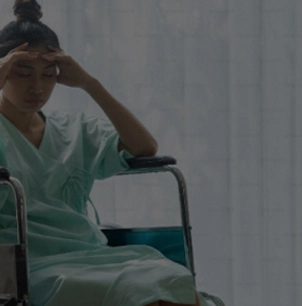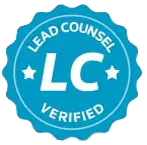"I am extremely pleased with the legal services I received. The lawyers were highly professional, knowledgeable, and responsive throughout the entire process. They kept me informed of every step and were always available to answer my questions. Thanks to their expertise and dedication, we achieved a successful outcome. I highly recommend this law firm to anyone seeking top-notch legal representation."///////////"Estoy sumamente satisfecha con los servicios legales que recibí. Los abogados fueron altamente profesionales, conocedores y receptivos durante todo el proceso. Me mantuvieron informada de cada paso y siempre estuvieron disponibles para responder mis preguntas. Gracias a su experiencia y dedicación, logramos un resultado exitoso. Recomiendo encarecidamente este bufete de abogados a cualquiera que busque una representación legal de primera categoría."
Great service. They helped my husband with an accident lawsuit everything was very smooth.
I highly recommend this firm. I personally worked with both Robert and William and they were absolutely great! Also, their entire team has been great working with. Thank you for your guys help with handling everything.
Thanks so much I couldn't did this without you guys. Thanks so much Will you is the best.
Les diera las 10 estrellas son lo mejor en cualquier caso.. la espectacular atención de su agente, Olga Ramos, es unica.. muchas gracias
Just received a massive settlement for my mother in-law through the Personal Injury Lawyers. The attorney William Schuster who handled the case was amazing in negotiating with the lien holders and was able to reduce the cost of hospital, physical therapy and even the chiropractic office fees, leaving her with even more money. I referred other people to different law firms in the past and I must say that Mr. William Schuster exceeded all of the previous settlements through different law firms. Great job sir!
I had an exceptional experience with The Personal Injury Lawyers. William, in particular, stood out with his quick updates and responsiveness to my concerns. The entire team worked diligently to ensure I received the rightful outcome for my case. Their professionalism, communication, and dedication are commendable. I highly recommend The Personal Injury Lawyers for anyone in need of legal representation in personal injury cases.
I had a injury case where I got ran over on my way to school, I didn’t know what to do then Mr Will Schuster came to the rescue, he told me what was gonna happen he made sure I was ok and I went to all my appointments and took care of everything, scheduling ect and worked with me in every step, although the case took long I am satisfied and plan on working with him and the lawyers of this LLC, Again thank you Will I appreciate and I know people will appreciate your work .
I recently had the pleasure of working with William at the personal injury lawyers for a personal injury case, and I couldn't be more satisfied with the experience. From the very beginning, William demonstrated exceptional professionalism, empathy, and dedication to my case.He took the time to thoroughly explain the legal process, answered all my questions, and kept me informed every step of the way. His expertise and attention to detail were evident, and I felt confident knowing that he was handling my case.William's commitment to achieving the best possible outcome for me was truly impressive. He worked tirelessly to ensure that I received the compensation I deserved, and his negotiation skills were top-notch.I highly recommend William and the personal injury lawyers to anyone in need of a personal injury attorney. They are a team of professionals who genuinely care about their clients and go above and beyond to deliver excellent results.Thank you, William, for your outstanding service and support during a challenging time. Your hard work and dedication made a significant difference in my life.
Great Experience, My Attorney Was Diligent And Communicative. (W.S)
I’ve had one of the best experiences with this personal injury firm. Attorney Will and my paralegal, Jocelyn, were so attentive and consistent with my case, and since I was willing to do my part to make sure I was responsive and cooperative things went smoothly. They made sure that I received a settlement that was equivalent to my damage and losses. I would recommend them for any personal injury claim, and will work with them in the future, whenever necessary. Thank you!
I am incredibly thankful to have had Rob as my lawyer. Through his excellent recommendation system, I received the appropriate care I needed to recover from my head on car accident. Rob and his team were able to guide me through every step of the process. When it came time for my settlement, they achieved the outcome I was hoping for. I will undoubtedly turn to him for any future legal matters. If you’re looking for a lawyer who has your best interest and will fight for you then rob and his team will do exactly that.
They are some of the best lawyers. If you need it done and done in a timely manner this is ur place to go. Mr .will schuster is just amazing. His communication is grate. And they always call back. If you need a good lawyer. This the place to call. Thank you guys for all the work and help you guys have given me .
Great Lawyers, really helpful, always keeping you in the loop and are very accessible. Definitely recommending them to family and friends!!!
Great attorney very honest and is direct as they come. Followed up when needed and make sure you did everything he needed to get the best results. Got a way better result then expected and likely better then most other firms would have as Robert when above and beyond and followed up. Most shocking do bare minimum and don’t communicate and to me communication is key and him and his staff exceeded my expectations. Definitely would recommend and likely will use services again if need to in future.
Best Law Firm in Chicago! The whole team was so respectful & responsible! Olga was the best! Highly recommend!
Stay away from this attorney, Robert Fakhourie had my work comp files and.delivered back to I'll work comp without giving me a reciept of files returned.My work comp case was dropped cause of this .Fakhouri refused to tell me who they gave files too.Robert Fakhouri has been abusing illegal pain scripts.Bad drug use..
I was very pleased with the hospitality and warmness of Robert Fakhouri and William Schuster and team . They were able to answer all my questions and always responded to me quickly. The Fakhouri Law Firm is truly #1 in my books . Thanks again Robert and the team .
This firm is absolutely great ! They handled 2 different car accidents for me and my employees. They are consistent with communication, and amazing at handling every single situation.
I’m very grateful that Rob was my lawyer. I was able to get the proper care I needed through their recommendation system and when the time came for settlement I got what I needed. I will definitely be using them for any other issues I encounter.
My experience with Robert Fakhouri was incredible. I can honestly say that all of my expectations were exceeded. Normally, I would not have known where to begin but he was recommended to me after tirelessly searching on how to go about my claim with no prior experience on the matter. Robert was able to answer any questions I had and always pushed for the best possible outcome. He provided frequent updates and reassurance. I cannot recommend Robert and his team enough!
Robbie and the whole team were amazing! They were very hands on throughout the whole process and made sure I was satisfied with the end result. I would definitely recommend this firm!
These guys know what they are doing/do not hesitate to give these guys a call they will take care of you/case
Robert was super helpful in handling all the details in my case. Very friendly and presented all the information to me clearly.
Originally I had signed my personal injury case over to a different law firm and for months there was no progress made. Once I had discovered the Fakhouri law firm my entire personal injury case had changed. Robert Fakhouri is an amazing attorney and took time and effort into every step and detail of my case ensuring the most amazing results. The entire staff of the Fakhouri law firm are very helpful, amazing and overall diligent in there work. Robert along with his staff ensured that my case was constantly being worked on. Highly recommend this law firm!
I’ve been involved in two other motor vehicle accidents and hired two other personal injury firms over the years. After having two awful experiences with both prior firms I was hesitant to contact Robert. However, after hearing nothing but great things I decided to hire The Fakhouri Firm. And I’m upset with myself because I wished I would have had The Fakhouri Firm represent me for my two prior motor vehicle accidents!! Such an amazing experience, and everyone worked so hard to obtain the highest settlement for me. If I could give them 10 stars I would. Thank you Robert and the team🙏
After reading other reviews I decided to hire Robert and his team to represent me for my personal injury case. And truthfully, I am so happy I did. The Fakhouri Firm was kind, communicative, caring, and most importantly HONEST. Robert never sugarcoated anything regarding my case, and he explained to me the facts that hurt my case and the facts that helped my case. He was very objective and transparent, but also extremely confident and knowledgeable. Most importantly, his entire team stood by their word. If my client care manager Jocelyn said she was going to call me in 2 weeks at 10 a.m., I got a phone call in 2 weeks at 10 a.m. Olga and William were also wonderful to communicate with. Thank you Fakhouri Team!!
WONDERFUL HONESTLY LITERALLY ONE OF THE GREATEST IN THE WORLD
My experience with The Fakhouri Firm and Robert Fakhouri has been splendid. Similar to other reviews, the whole team was so respectful and VERY responsive. And the case managers and attorneys called me every 14-21 days just to check up on me. They actually cared about me and my health, and I’m so grateful for that. Highly recommend!
Attorney Robert was always there to explain my options ,he worked hard to gather all the information needed for my case. Robert returned every call in a timely matter and made me feel at ease throughout this whole process.Not only is Robert knowledgeable ,honest and works hard for his clients . He also cares about his clients .
I had the utmost pleasure collaborating with Robert and his exceptional team. Throughout the entire process, their professionalism and responsiveness stood out. The client care managers consistently provided me with timely updates, ensuring that I was always well-informed. Thanks to the remarkable efforts of Robert and William, I was able to secure a remarkable settlement. I wholeheartedly endorse their services and highly recommend them to others seeking exceptional legal representation.
I am a current client and honestly been such a good experience working with Robert and his team. Robert took over immediately after my accident handled everything quickly I did physical therapy pain doctors and throughout his team has checked up on me. William also gets a 5 star review for helping me . Thanks to the firm everything has been going smoothly and highly recommend.
This is my first time dealing with a personal injury! I had no knowledge nor experience on how to go about my claim until my clients told me about, The Fakhouri Firm! I was assigned, Will, to help me understand how the whole process works and not only did I learn the process, I felt welcomed by the staff, who were patient and wanting to make sure I was ok!! Best feeling ever when you think you're all alone but with the The Fakhouri Firm, I felt safe!! Highly recommended!!!
Great Team!!! Thank you Robby & The Team!!
I would love to acknowledge Robert Fakhouri and his law firm on their outstanding job handling my case! It was my first time being in the situation I was and completely clueless on next steps, what needs to be done, etc. To say the least it was overwhelming. Robert was there for me every step of the way, was open to any questions I had (big or small), and was super patient and understanding. I definitely appreciate how straight forward he is, and at the same time, willing to educate you for you to understand and not be kept in the dark during the case. He went ABOVE AND BEYOND settling my case and got me an amount higher than I expected to even get, and truly was able to settle it in the best and most comforting way possible and give me the piece of mind I needed! 10/10, would definitely recommend him to anyone in need of legal assistance. Top notch, and pure class!
Robert did an excellent job and we had a great result for my case. I would highly recommend him to anyone looking for a motivated attorney who is going to work very hard to get you the results you need! We switched to Robert from another attorney we had to fire and the results were night and day. Highly recommend!!
I want to give big thanks to Robert Fakhouri and his law firm for being patient, knowledgeable and understanding throughout my entire case! I can't thank you all enough! 10/10 highly recommend
Robby, is one of the greatest personal injury lawyer in Chicago. He also had donated his time and efforts to the homeless community around Chicago. Trust and believe he will get the job done!! Thanks
Long story short, I was in a bad situation where someone was attacking my character, spreading lies, and saying I was in breach of a contract. I knew all of the above were not true, however I was not sure where to turn to , or where to go. The ordeal with the person accusing me effected my quality of life for two years.Then I spoke with Robby Fakhouri only seeking an answer to a legal question.After asking the question and elaborating on my situation, he was so disturbed by how I was treated that he immediately filed an appearance to represent me, for my court day that was 3 days away . Mr. Fakhouri represented me out of the kindness of his heart. He saw the impact the case was taking on me , and when he told me he was going to represent me , I KNEW everything would play out for what was/ is right & just. He took time out of his insane work load (Due to him being the top lawyer in Chicago ) in order to help me. There was zero question about his values, or moral compass.If you want A) A good person, and B) Someone that will fight for you like you are their family; with all the energy, tenacity, focus, along with not hoping- - but KNOWING he will win for you, against anyone he is up against...Mr. Robby Fakhouri is who you not only want on your side, but NEED to represent you .There will be no other council I will seek aside from Mr. Robby Fakhouri
He had donated bags of necessary items to homeless people in their tents and I called him to see if I could donate a little bit you know to help him continue his effort and he said he's not even a 501c3 to accept cash to help with the load of the gift bags and he's a wonderful man and he's got a heart of gold I thought what he did was very very humanely conscious and so appropriate for the season
Very thorough and professional.. I appreciate the representation. I’d recommend The Fakhouri Firm ANYTIME
The Fakhouri Firm,LLC Mr. Robert Fakhouri and his team were awesome they helped me with my case and kept me up to date with everything and easy to work with .definitely highly recommended
I have used Mr. Fakhouri twice now and I couldn't recommend anyone better! He is so passionate at what he does and is truly amazing. Today I cried the happiest tears because thanks to him an incident that happened 2 years ago is finally settled. I will send anyone who needs justice from an injury his way. Thank you so much Robert Fakhouri for all your hard work
Robert is the most hard working and dedicated lawyer i know. He always puts 1000% into his work and I am so grateful for his hard work.
The most professional law firm. Robert has been such a great help and I’m so thankful for him. I went in knowing nothing about my case, and Robert helped lead me every step of the way! If you ever need a lawyer, definitely call Robert:)
On my wedding day, my florist did not do the things we paid for. The church was suppose to be decorated and wasn't, our bouquets were not delivered on time which delayed our wedding photos, we were suppose to have an elaborate hanging flower display at the head table and that didn't happen, also family members had to complete the area were guest go to pick up their table numbers because the florist did not do it. Your wedding day is suppose to be the best day of your life and this situation obviously caused so much stress on the day.Robert was able to get us almost full compensation on what we paid the florist who did not do the things we had paid for. He was wonderful to work with, understood how upsetting the situation was for us, and did everything in his power to right what happened. I would absolutely recommend him to anyone in need of legal assistance.
Overall great experience. Robert is honest, understanding, and reliable. He goes above and beyond to meet his clients’ expectations to their ultimate satisfaction, respectfully and professionally.
Robert is very responsive, very professional and I had a wonderful experience with this office. Mr. Fakhouri was very polite and sincere in answering my questions and addressing my concerns! 10/10 experience! Would recommend to anyone!
I found my experience with the Fakhouri firm to be very professional and courteous. Robert, the owner, was very responsive and guided me through all my needs while truly showing empathy. I highly recommend this firm as they stood by my corner helping me through the entire process with total ease.
I called the Fakhouri Firm needing advice on a situation. I initially to Olga who was extremely helpful. I then spoke to Mr. Fakhouri who took the time to answer all of my questions in a extremely professional manner. Thank you to The Fakhouri Firm.
So so helpful, he was able to point us in the right direction regarding finding the perfect attorney to suit our needs. So grateful!
Robert took the time to answer my questions during a consultation and showed that he truly cared about my future and well-being. He was very empathetic about my situation and informed me of all my legal options. I would highly recommend hiring him as your attorney. Truly a gentleman and class act. 10/10
thank you mr. r fakhouri you are definatley the best!!!! your knowledge and expertinse is outstanding you dont merely see your clints as clints but as family thank you for everything you did for me with my case iam so grateful for finding you keep up the good work i highly commanded fakhouri
Great professional service. Fakhouri was very detail with processes. Extremely satisfied, definitely recommend 100%.
Amazing team, took care of my case and settled it in no time.
Can't say enough good things about Mr Fakhouri Respect is what comes to mind
Robert Fakhouri, the man behind the firm, the leader of the pact, the unstoppable human who wants to see peace and justice for all who deserve it.It started off years and years back, as Robert aka Robby, being my best friend's brother, to then being my friend, to then being my lawyer, someone who changed my life.It has been almost a year since my whole life has changed.This is how my story goes.I, by no means ride motorcycles, but, my friend had one, and the second time I got on it, I never knew it would be my last. We were on the highway, and the next thing you know, I woke up in an ambulance.It was a hit and run accident. I was out of work for almost 2 months straight, bed ridden and unable to do anything myself.I was in horrible pain, not only physically, but mentally.I have been a health freak and athlete my whole life and after the accident I felt so defeated. I had pain all over my body that would not go away.After weeks had past, and chronic pain all over my body, I began to speak with the insurance company and had almost come to agreement with them, that they would cover all my medical bills, plus compensate me for my time spent out of work.I never knew, I could actually be compensated for my endless pain and suffering.I almost signed off with the insurance company, until I decided to open up to Robby and tell him about my accident.After telling him about my accident, I felt the biggest sense of relief because he told me I would be taken care of, and I deserved to be taken care of, based off my injuries. From that point forward, Robby took my case into his own hands, and told me all I needed to do was trust him and let him take care of the rest.Well, I did just that, after almost settling for pennies, with the insurance, Robby called me and told me it was time to finally come and pick up my settlement check. Pennies is what I would have received had I not gone to Robby and let him take care of me. Instead I ended up walking away with close to a six-figure-settlement.If you are struggling and don't know where to turn, or need someone on your side who can get you the justice you deserve, Robby Fakhouri is who you want.I can not say enough about Robby, he is pure, genuine, honest, and straight forward. He knows how to get the job done and he is unstoppable. Robby has a heart so giving and he wants the best for all who are in front of him. There are not many lawyers who you can say are personable and want your best interest, Robby is just that.I can not put into words the gratitude I have for Robby. He will forever hold a dear place in my heart.Thank you Robby for your service!!
















